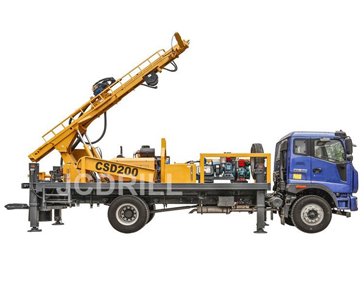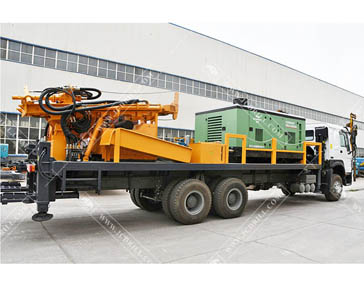For water well drilling rigs, the general requirements are simple configuration, low energy consumption, easy operation, mobility, versatility and small size. In practice, the choice of drilling rig must be based on the stratigraphy, hole size, and depth as well as the drilling method.
1. Drilling efficiency
Drilling efficiency depends on the formation, the skill/experience of the operator, the type of drilling machine and the drilling method.
For rocky conditions, the most efficient method is to use a downhole drilling rig in conjunction with an air compressor.
For soil, clay and sand conditions, the best method is to use a drilling rig with a mud pump.
For cobbles, a reverse circulation system is the most suitable method of drilling. Simply add a set of reverse circulation drilling tools to the existing rig.
Truck Water Well Drilling Rig
2. Price
The price of the machine is a key factor in one's choice of the right drilling rig and is a one-off investment. The price of the machine increases with the diameter and depth of the hole.
From the Drilling method point of view, a DTH drilling rig is more expensive than a coring drilling rig, and the price of a hydraulic drilling rig is higher than a vertical shaft drilling rig, which is a more mechanical drilling machine
From mobility point of view, truck-mounted drills cost more than crawler-mounted drills.
3. Operating costs
Operating costs significantly affect the profit one can make in the drilling business. Net profit is the amount of money a driller receives from well users for water well drilling minus operating costs.
Operating costs include personnel salaries, casing, mud and fuel costs, and rig maintenance costs.
In terms of rig type, Down The Hole (DTH) rigs have higher operating costs than rotary rigs that work with mud pumps. This is because submersible drilling rigs require air compressors and consume very high amounts of fuel. Vertical drilling rigs (mechanically driven) are more economical than hydraulic rigs.
4 . Drilling methods
In terms of the working principle of the drilling rig, there are 3 main drilling methods.
The Down The Hole drilling method needs to be used in conjunction with an air compressor. This is a good method for rock conditions.
Mud pump rotary drilling is a more economical way of drilling and is ideal for soil, sand, and clay formations and, for rock, has a lower drilling speed than submersible drilling.
With auger drilling, no air compressor or mud pump is required for the drilling process. However, it can only drill soils, clays and sands.
In terms of the drilling process, we have 2 drilling methods.
Direct circulation drilling, where the drilling fluid (air or mud) is passed through the drill pipe and the drill cuttings are removed through the space between the outside of the drill pipe and the hole wall.
Reverse circulation drilling, which requires a double-walled drill pipe. The drilling fluid passes through the space between the inner wall of the outer pipe and the outer wall of the inner pipe. It is the most effective drilling method for cobbles and sandy, soil geological structures.
5. Availability of spare parts
One needs to consider the availability of spare parts when buying a drilling rig. It is part of the operating costs. If spare parts are not readily available, it means you have to pay more to get them and it takes longer. All this will definitely affect the profitability of the drilling business.
These are just some of the basics of rig selection. It can be used as a guide for entrepreneurs buying a drilling rig. If you want to know more information about types of drilling rigs, welcome to contact us today or request a quote.



没有评论:
发表评论